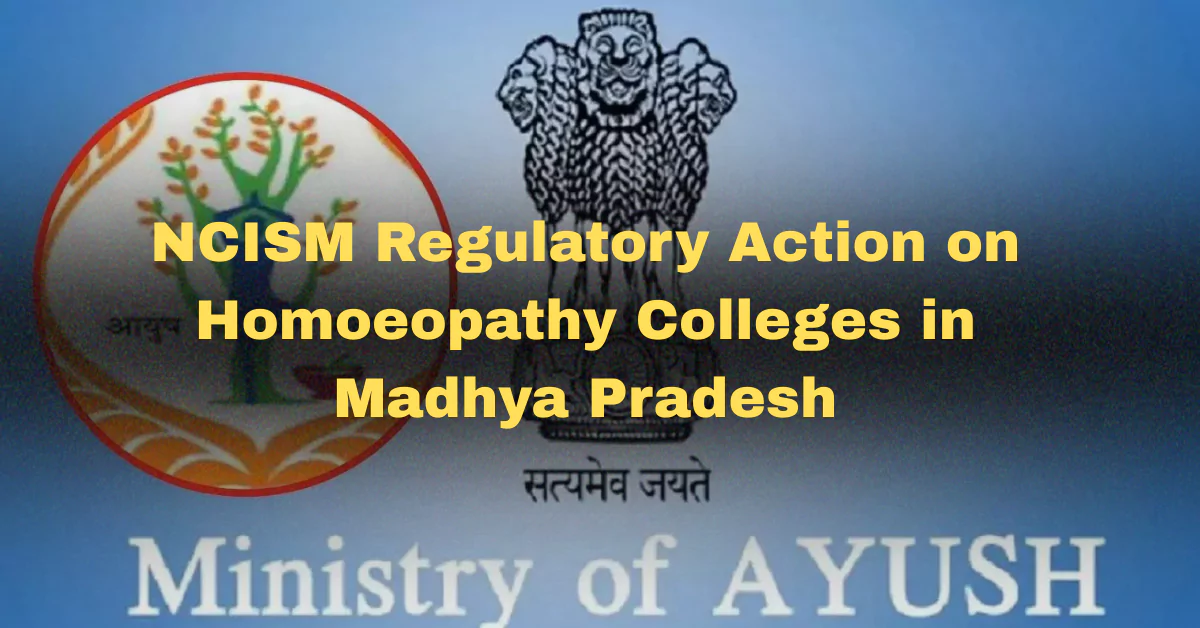The National Commission for Indian System of Medicine (NCISM) has refused recognition to seven private homoeopathy colleges in Madhya Pradesh for the academic session 2025-26. NCISM also granted a conditional nod for 11 other colleges in MP under the NCISM Act, 2020.
Why NCISM Denied Recognition to 7 Colleges
NCISM denied recognition to 7 colleges because of severe deficiencies in critical areas:
- Inadequate teaching staff
- Insufficient patient numbers in both inpatient and outpatient departments
Such shortcomings directly impact the colleges’ capacity to provide effective clinical training, which is vital for the holistic education of homoeopathy students.
List of Homoeopathy Colleges Denied Recognition in MP
- Swami Pranavanand Homoeopathic Medical College and Hospital, Chhatarpur
- Aarihant Homoeopathic Medical College, Sendhwa, Barwani district
- Sagar Homoeopathic Medical College & Hospital Research Centre, Sagar
- Sheetla Sahai Homoeopathy Medical College & Research Institute Cancer Hospital, Gwalior
- Shri Ramnath Singh Siksha Prasar Samiti Homoeopathic Medical College, Gormi, Bhind
- Sophia Homoeopathic Medical College (Swastik Educational & Social Welfare Society’s), Gwalior
- Shivang Homoeopathic Medical College and Hospital, Nayapura, Kolar Road
These denials highlight NCISM’s stringent expectations for infrastructure, faculty presence, and clinical exposure necessary to uphold academic and practical standards.
Conditional Recognition to 11 Homoeopathy Colleges
NCISM has granted conditional recognition to 11 homoeopathy colleges in Madhya Pradesh. This conditional status means that while they meet the minimum requirements for the academic year, they must address certain issues to continue recognition.
Impact on Students and Medical Education
Impact on Student
Students at the seven “denied” colleges face uncertainty regarding their admissions, continuity of education, and future careers. Without official recognition, degrees may not be valid.
NCISM Regulatory Enforcement
This strong action shows NCISM’s commitment to enforcing high educational standards under the National Commission for Indian System of Medicine Act, 2020. Colleges must present clinical infrastructure and adequate faculty to ensure meaningful training and patient care.
| The National Commission for Indian System of Medicine Act, 2020 is a landmark legislation that established the National Commission for Indian System of Medicine (NCISM) to regulate education and professional practice in Ayurveda, Unani, Siddha, and other traditional systems. It replaced the Indian Medicine Central Council Act, 1970, with the aim of creating a more accessible, equitable, and quality-driven framework for medical education. The Act emphasizes research promotion, ethical standards, and excellence in healthcare delivery. Functioning under the Ministry of Ayush, the NCISM carries out its responsibilities through autonomous boards such as the Board of Ayurveda and the Medical Assessment and Rating Board. |
Conditions for the Recognised Institutions
The colleges that received conditional recognition must expedite improvements, perhaps by augmenting faculty strength, improving patient inflow, or upgrading facilities, to retain their recognition status.
Statewide Educational Quality
The contrasting approvals spotlight gaps in certain institutions and serve as a wake-up call across the state. It pushes both managements and regulatory bodies toward more rigorous compliance.
The NCISM’s decisive action on August 25, 2025, marks a significant moment in the oversight of AYUSH education, especially in ensuring quality, compliance, and institutional accountability in the field of homoeopathy education.
Going forward, it’s key to monitor:
- How colleges respond, whether they appeal, upgrade, or face prolonged suspension
- Do the status updates on the conditionally approved institutions, do they meet the timeline and requirements?
- Broader implications for homoeopathy admissions and reputation in MP and beyond

